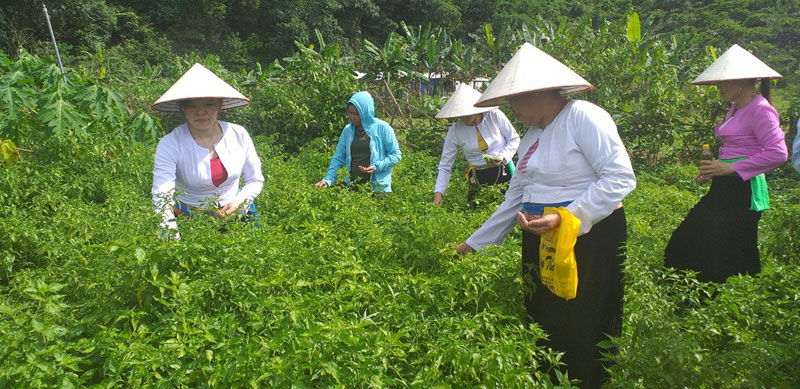
(HBO) - Forestry Chili has been a long time in Phu Luong. The people often go to the forest to collect chili to make the spice for everyday meals. Indeed, only the soil and climate conditions of Phu Luong region make forestry chili have a special aroma and a spicy taste. If they fertile in alluvial soil, the original characteristics will be lost.
 The members of Phu Luong forestry chili cooperative (Lac Son) are collecting chili.
The members of Phu Luong forestry chili cooperative (Lac Son) are collecting chili.
Having seen the value of wild chili, the people have been looking for the seeds to grow and sell in a small ways. Since the establishment of Phu Luong forestry chili cooperative in 2018, the women in Ban hamlet, Phu Luong commune have more opportunities to help each other in developing production, contributing to building the brand name of Phu Luong forestry chili.
The forestry chili has been planting in shallow fields along the forest edge. Currently, there have been 15 members in the cooperative participating in the project to build the brand name of Phu Luong forestry chili. The members have been trained in techniques and supporting to look for the market for the output.
From the idea of "planting chili in the biological direction” of the Women's Union in Lac Son district in the contest of finding a start-up idea for women of the Central Women's Union of Vietnam with an award of 157 million dongs. With this fund, the district's Women's Union has supported the cooperative to develop a 3,000 m2 model of chili planting in Ban and Thenh hamlets, yielding nearly 700 kg. The selling price of the fresh chili is about 120,000 VND a kg, which has brought a stable source of income for the members. The life cycle of a chili is one year.
After having been harvested, the chili is finish uprooted and then it is sowed and replanted. 700 chili trees are grown in every 1,000 m2. After 4 months, the chili would be flowering and fruiting. The chili trees will be collected in 4 consecutive months with 700 grams every chili tree. With the characteristic of the spicy, fragrant and delicious flavor, Phu Luong forestry chili has been a popular product. After being harvested, the members of the cooperative preliminary process by making them clean, preserve in salt and then process them into salt chili and put them into a glass jars.
Now, Phu Luong forestry chili product has been packed in glass jars of 100 grams with a price of 35,000 VND. It is a product certified to ensure the food safety with the expiry date of 24 months. There are 2 selling points and product introduction in Ky Son and Lac Thuy district. So far, 1,500 products have been sold. According to calculations, the income is about 45 million VND a year. This is a really potential crop for women to rise out of poverty.
However, the most important problem is to build the brand name of Phu Luong forestry chili and to improve the product quality. And the forestry chilli necessarily needs modeling and packaging, registering the food and hygiene safety, designing the labels, registering the bar codes of the product traceability.
In Lac Thuy district, communes have been succeeded in promoting their One Commune-One Product (OCOP) products while others are still struggling to position their typical farming products in market. Some communes in the district still fail to have their products met OCOP programme’s requirements, while others have seen their certifications expired.
The inspectorate agency of Hoa Binh province has issued Official Dispatch No. 1090/TTr-PCTN to provincial departments, agencies, localities, business associations, enterprises, and investors regarding measures to improve informal component indexes of the Provincial Competitiveness Index (PCI).
Hoa Binh is taking concrete steps to improve its investment environment, with a strong focus on supporting businesses, settling obstacles for strategic investors, and creating opportunities for robust development in the coming years.
Under the blazing early summer sun, the construction site of Nhuan Trach Industrial Park (IP) in Luong Son district is abuzz with activities from dawn to dusk, a testament to the determination of the investor to meet their construction targets on schedule.



 The members of Phu Luong forestry chili cooperative (Lac Son) are collecting chili.
The members of Phu Luong forestry chili cooperative (Lac Son) are collecting chili.